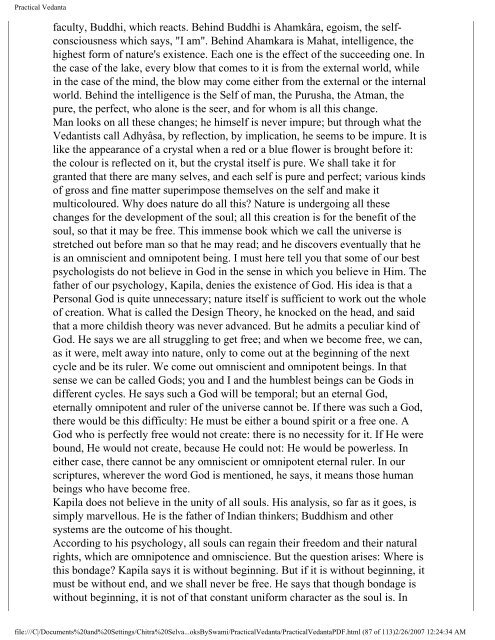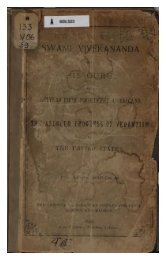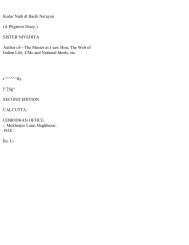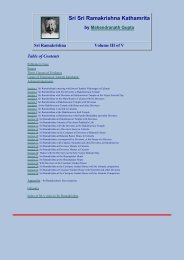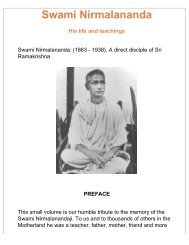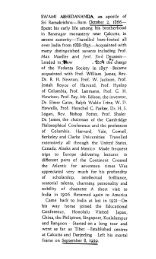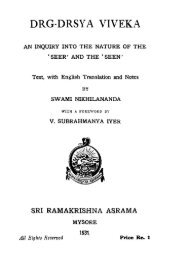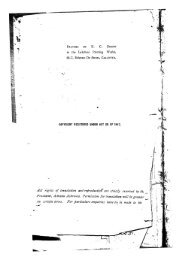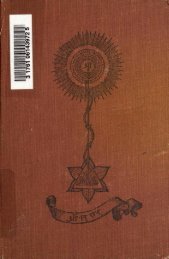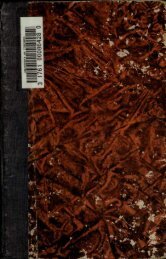<strong>Practical</strong> <strong>Vedanta</strong>not see it move towards me. That which comes from the flower and in contactwith my nose is called the Tanmatra, fine molecules of that flower. So with heat,light and everything. These Tanmatras can again be subdivided into atoms.Different philosophers have different theories, and we know these are onlytheories. It is sufficient for our purpose to know that everything gross is composedof things that are very, very fine. We first get the gross elements which we feelexternally, and then come the fine elements with which the nose, eyes, and earscome in contact. Ether waves touch my eyes; I cannot see them, yet I know theymust come in contact with my eyes before I can see light.Here are the eyes, but the eyes do not see. Take away the brain centre; the eyeswill still be there, as also the picture of the outside world complete on the retinae;yet the eyes will not see. So the eyes are only a secondary instrument, not theorgan of vision. The organ of vision is the nerve-centre in the brain. Likewise thenose is an instrument, and there is an organ behind it. The senses are simply theexternal instruments. It may be said that these different organs, Indriyas, as theyare called in Sanskrit, are the real seats of perception.It is necessary for the mind to be joined to an organ to perceive. It is a commonexperience that we do not hear the clock strike when we happen to be buried instudy. Why? The ear was there, the sound was carried through it to the brain; yet itwas not heard, because the mind did not attach itself to the organ of hearing.There is a different organ for each different instrument. For, if one served for all,we should find that when the mind joined itself to it, all the senses would beequally active. But it is not so, as we have seen from the instance of the clock. Ifthere was only one organ for all the instruments, the mind would see and hear atthe same time, would see and hear and smell at the same time, and it would beimpossible for it not to do all these at one and the same time. Therefore it isnecessary that there should be a separate organ for each sense. This has beenborne out by modern physiology. It is certainly possible for us to hear and see atthe same time, but that is because the mind attaches itself partially to the twocentres.What are the organs made of? We see that the instruments — eyes, nose, and ears— are made of gross materials. The organs are also made of matter. Just as thebody is composed of gross materials, and manufactures Prana into different grossforces, so the organs are composed of the fine elements, Akasha, Vayu, Tejas, etc.,and manufacture Prana into the finer forces of perception. The organs, the Pranafunctions, the mind and the Buddhi combined, are called the finer body of man —the Linga or Sukshma Sharira. The Linga Sharira has a real form becauseeverything material must have a form.The mind is called the Manas, the Chitta in Vritti or vibrating, the unsettled state.If you throw a stone in a lake, first there will be vibration, and then resistance. Fora moment the water will vibrate and then it will react on the stone. So when anyimpression comes on the Chitta, it first vibrates a little. That is called the Manas.The mind carries the impression farther in, and presents it to the determinativefile:///C|/Documents%20and%20Settings/Chitra%20Selva...oksBySwami/<strong>Practical</strong><strong>Vedanta</strong>/<strong>Practical</strong><strong>Vedanta</strong>PDF.html (86 of 113)2/26/2007 12:24:34 AM
<strong>Practical</strong> <strong>Vedanta</strong>faculty, Buddhi, which reacts. Behind Buddhi is Ahamkâra, egoism, the selfconsciousnesswhich says, "I am". Behind Ahamkara is Mahat, intelligence, thehighest form of nature's existence. Each one is the effect of the succeeding one. Inthe case of the lake, every blow that comes to it is from the external world, whilein the case of the mind, the blow may come either from the external or the internalworld. Behind the intelligence is the Self of man, the Purusha, the Atman, thepure, the perfect, who alone is the seer, and for whom is all this change.Man looks on all these changes; he himself is never impure; but through what theVedantists call Adhyâsa, by reflection, by implication, he seems to be impure. It islike the appearance of a crystal when a red or a blue flower is brought before it:the colour is reflected on it, but the crystal itself is pure. We shall take it forgranted that there are many selves, and each self is pure and perfect; various kindsof gross and fine matter superimpose themselves on the self and make itmulticoloured. Why does nature do all this? Nature is undergoing all thesechanges for the development of the soul; all this creation is for the benefit of thesoul, so that it may be free. This immense book which we call the universe isstretched out before man so that he may read; and he discovers eventually that heis an omniscient and omnipotent being. I must here tell you that some of our bestpsychologists do not believe in God in the sense in which you believe in Him. Thefather of our psychology, Kapila, denies the existence of God. His idea is that aPersonal God is quite unnecessary; nature itself is sufficient to work out the wholeof creation. What is called the Design Theory, he knocked on the head, and saidthat a more childish theory was never advanced. But he admits a peculiar kind ofGod. He says we are all struggling to get free; and when we become free, we can,as it were, melt away into nature, only to come out at the beginning of the nextcycle and be its ruler. We come out omniscient and omnipotent beings. In thatsense we can be called Gods; you and I and the humblest beings can be Gods indifferent cycles. He says such a God will be temporal; but an eternal God,eternally omnipotent and ruler of the universe cannot be. If there was such a God,there would be this difficulty: He must be either a bound spirit or a free one. AGod who is perfectly free would not create: there is no necessity for it. If He werebound, He would not create, because He could not: He would be powerless. Ineither case, there cannot be any omniscient or omnipotent eternal ruler. In ourscriptures, wherever the word God is mentioned, he says, it means those humanbeings who have become free.Kapila does not believe in the unity of all souls. His analysis, so far as it goes, issimply marvellous. He is the father of Indian thinkers; Buddhism and othersystems are the outcome of his thought.According to his psychology, all souls can regain their freedom and their naturalrights, which are omnipotence and omniscience. But the question arises: Where isthis bondage? Kapila says it is without beginning. But if it is without beginning, itmust be without end, and we shall never be free. He says that though bondage iswithout beginning, it is not of that constant uniform character as the soul is. Infile:///C|/Documents%20and%20Settings/Chitra%20Selva...oksBySwami/<strong>Practical</strong><strong>Vedanta</strong>/<strong>Practical</strong><strong>Vedanta</strong>PDF.html (87 of 113)2/26/2007 12:24:34 AM
- Page 1 and 2:
Practical VedantaPractical VedantaP
- Page 3 and 4:
Practical Vedantaworld. If I am a s
- Page 5 and 6:
Practical Vedantadifference is only
- Page 7 and 8:
Practical VedantaThe ideal of faith
- Page 9 and 10:
Practical Vedantamoment of our live
- Page 11 and 12:
Practical Vedantaof the Christs and
- Page 13 and 14:
Practical Vedanta"This life is Brah
- Page 15 and 16:
Practical Vedantadark fifteen days,
- Page 17 and 18:
Practical Vedantalife. This is the
- Page 19 and 20:
Practical Vedantaeverything would b
- Page 21 and 22:
Practical Vedantait is only through
- Page 23 and 24:
Practical Vedantawhich is that subt
- Page 25 and 26:
Practical Vedantanoumenon and pheno
- Page 27 and 28:
Practical Vedantato which is the be
- Page 29 and 30:
Practical VedantaAbsolute.The finit
- Page 31 and 32:
Practical Vedantawhich is not the q
- Page 33 and 34:
Practical Vedantaexperience that th
- Page 35 and 36: Practical Vedantafulfilled. The Jiv
- Page 37 and 38: Practical Vedantabetween the pure r
- Page 39 and 40: Practical Vedantacome out straight.
- Page 41 and 42: Practical Vedantawar with one anoth
- Page 43 and 44: Practical Vedantanobody could under
- Page 45 and 46: Practical VedantaMy idea, therefore
- Page 47 and 48: Practical Vedantathe same methods.
- Page 49 and 50: Practical Vedantavarious minds, all
- Page 51 and 52: Practical Vedantabrotherhood; but t
- Page 53 and 54: Practical Vedantabrotherhood, but w
- Page 55 and 56: Practical Vedantawe all go with ves
- Page 57 and 58: Practical Vedantareason. What can y
- Page 59 and 60: Practical Vedantabeen preached in t
- Page 61 and 62: Practical Vedantathe husband kisses
- Page 63 and 64: Practical Vedantaof the knowledge a
- Page 65 and 66: Practical Vedantafor those who only
- Page 67 and 68: Practical Vedantasun exists because
- Page 69 and 70: Practical Vedantaof death was pleas
- Page 71 and 72: Practical VedantaGod. We must learn
- Page 73 and 74: Practical Vedantaa plague comes, it
- Page 75 and 76: Practical VedantaAtman? "As with a
- Page 77 and 78: Practical Vedantathat immortal One,
- Page 79 and 80: Practical Vedantaand the third egoi
- Page 81 and 82: Practical VedantaWitness of the uni
- Page 83 and 84: Practical VedantaPractical Vedanta1
- Page 85: Practical Vedantaeternal ; every ot
- Page 89 and 90: Practical VedantaPractical Vedanta1
- Page 91 and 92: Practical Vedantastepping-stone to
- Page 93 and 94: Practical Vedantarecognition? Findi
- Page 95 and 96: Practical Vedantasentient." This is
- Page 97 and 98: Practical Vedantaessentially differ
- Page 99 and 100: Practical Vedantaexistence is limit
- Page 101 and 102: Practical Vedantalive, for I am lif
- Page 103 and 104: Practical Vedantasee from Kapila's
- Page 105 and 106: Practical Vedantalimitation, but th
- Page 107 and 108: Practical Vedantaperfect, infinite,
- Page 109 and 110: Practical Vedantaindividuality, of
- Page 111 and 112: Practical Vedantarepeat [something]
- Page 113: Practical Vedantaperson who dies in


